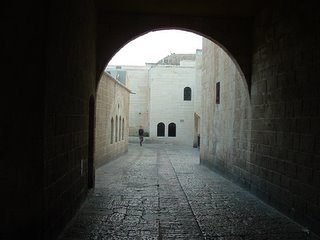Arutz Sheva:President M. Katzav has criticism of both sides in yesterday's Amona violence, B'Tselem calls for an investigation, and the Knesset Speaker has agreed to a Likud/Shas request for a special session.
President Moshe Katzav said that "red lines" were crossed yesterday, and that what happened in Amona is "intolerable." He said that the police must explain why they used horses and clubs, and chastised the settlement enterprise leaders for organizing the protest without controlling the protestors.
Katzav said he accepts Labor MK Yuli Tamir's call for a public commission of inquiry into the events.
The B'Tselem civil rights organization, too, has asked Attorney General Menachem Mazuz to order an investigation into the "excessive police violence" during the evacuation/destruction of the homes in Amona. B'Tselem says that illegal orders may have been handed down, and that individual policemen must be investigated for acting with violence towards protestors who did not actively resist.
Labor Party Chairman Amir Peretz, who met with President Katzav, joined his call for an inquiry - but directed his anger at the settlers. "A settler must not raise his hand against a soldier or policeman," he said, "and the police deserve our full support."
The National Religious Party said it would also demand a national inquiry. NRP head MK Zevulun Orlev said that according to what he has learned, "most of the protestors exhibited only passive resistance, and yet despite this, the police used strong violence that led to the injuring of 200 people."The Yesha Council, as well, demands an investigation into the violence of yesterday. The organization will hold a large rally in Jerusalem this coming Sunday to demand as much.
Yesha Council leader Pinchas Wallerstein said, "There is no doubt that the police received instructions to hit us without provocation. Whoever was in the houses was hit, even if they just sat on the floor arm-in-arm. The police came with their clubs to break our bones."
As an example, Kiryat Arba resident Rabbi Shraga Orazi, 50, was in one of the houses - and was hit mercilessly precisely after he informed a Yassam policeman that he was ill. "We agreed beforehand that none of us would raise a hand to the police," Rabbi Orazi told Arutz-7's Ruth Avrahami, "and we would simply sit in our places... When the police burst in, they immediately began hitting us."
The rabbi, who suffers from asthma and type-1 diabetes, said, "I turned to one of the policemen and asked him not to hit me because I was sick. When he heard this, I saw his eyes light up, and he started to hit me with great zest, over and over."
Click here for Arutz-7's IsraelNN Television report on Rabbi Orazi.
The extremist Peace Now organization responded: "The demand for a commission of inquiry is miserable, unnecessary mistake."
In response, Yesha Council Director Avner Shimoni said, "If Peace Now thinks it's a mistake, then apparently they know something that the rest of the country does not." Peace Now was responsible for the original court suit that led to the destruction of the nine Amona homes.
Shimoni said that the Yesha Council will soon submit a Supreme Court petition demanding the destruction of over 30,000 illegal Arab-sector structures that have been declared illegal.
A Russian Neo-Nazi site appears proud to inform its readers of what it calls the "pogrom" in Amona. Headlining its story, "Massive Anti-Jewish Pogrom... in Israel," the site feature photos depicting some of the most extreme violence in Amona. One of the pictures is captioned, "These are not Russian Kosssaks - these are Israeli mounted troops.
"The site provides background for the story by explaining, "Israeli police stormed the Jewish settlement of Amona... The evacuation of this small settlement, numbering nine houses, established a few years ago with Sharon's consent, started with the confirmation of the Supreme Court. Citizens of Amona and Ultra-Right Jewish organizations, numbering 2,000 people, concentrated in Amona in its defense. Against them were arraigned 2,000 soldiers and about 3,000 police. In the end, the eviction transformed into a huge Jewish Pogrom, in which the role of the attackers was played by... Jews. We [hereby] bring to your attention to a photo essay of the eviction of Amona."
Twelve people are still hospitalized following yesterday's violence in Amona. MK Effie Eitam (National Union), spent the night in the hospital with a head wound, and was released this afernoon. Fifteen-year-old Yechiam Eyal of Psagot, who was rendered unconscious by the police violence, is now listed in moderate condition. The others are in light condition.
Thirty-four people were arrested yesterday, and 19 of them are still in prison. Four have already been indicted.











